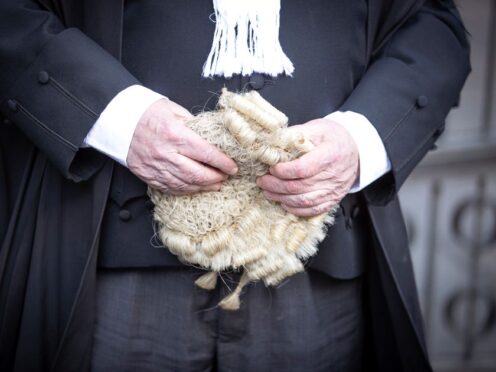
Controversial proposals to pilot rape trials without a jury should be ditched, lawyers have said, after a Holyrood committee failed to give its backing to the move.
The Law Society of Scotland has urged the Scottish Government to abandon plans to hold trials for rape and attempted rape before a judge alone, instead of having a judge and jury.
It is also urging ministers not to go ahead with the abolition of Scotland’s unique not proven verdict if new “balancing provisions” for juries are not included in the changes.
The measures are all included in the Victims, Witnesses and Justice Reform (Scotland) Bill, which is currently being considered by Holyrood.
However, in a major report, MSPs on the Criminal Justice Committee revealed they were split on the proposal to hold juryless trials for rape and attempted rape cases – with the four SNP MSPs supporting the move, while the two Labour and two Conservative MSPs on the committee were opposed to it.
Members of the Scottish Solicitors Bar Association have already threatened to boycott such trials if they go ahead.
Meanwhile, Law Society of Scotland president Sheila Webster said the committee report “further underlines” its concerns about “key elements of the Bill”.
Describing the proposed pilot for juryless rape trials as the “most controversial” part of the Government’s legislation, she added: “The lack of consensus confirms this plan is flawed, and is lacking detail and supporting evidence.
“It should be removed from the Bill.”
Ms Webster went on to say the society had “significant concerns” about the section of the report dealing with the not proven verdict.
She stated: “It appears that committee members support scrapping the third verdict despite acknowledging they don’t know what the impact of that decision will be.
“Scrapping not proven without any balancing provisions would be an entirely unacceptable outcome with unforeseeable outcomes.
“If there is insufficient evidence to decide on jury size and verdict majority, then not proven must be retained.”
Since June 2023 we have been considering written and oral evidence on the Victims, Witnesses, and Justice Reform (Scotland) Bill #VWJRBill. Read our full Stage 1 report on the Bill here: https://t.co/KdIHLmnijL pic.twitter.com/2ymbqnUZZP
— Criminal Justice Committee (@SP_Justice) March 29, 2024
As well as abolishing the not proven verdict, the Bill also proposes to reduce the number of jurors needed for trials, along with changing the proportion needed to find an accused person guilty of an offence.
Currently, a person can be found guilty if eight members of a jury of 15 agree that it is the correct verdict, but the the Bill proposes at least eight members of a smaller jury of 12 people would be required for any conviction.
After Scotland’s most senior prosecutor, Lord Advocate Dorothy Bain KC, warned this could make it harder to secure convictions, the committee said it could not support the proposed changes to jury size and majority, with MSPs saying they had “not heard compelling evidence to support this”.
However, the Law Society said it still supported the establishment of a new Victims Commissioner – another proposal in the Bill – despite MSPs not backing this.
The committee said in its report that MSPs “remain to be convinced that a strong case has been made” for such a post.
But speaking for the Law Society, Ms Webster said: “We remain supportive of significant parts of the Bill including around the anonymity of complainers in sexual offence cases, the establishment of a new Commissioner, and a focus on trauma informed practice.”
Justice Secretary Angela Constance said: “The committee heard compelling evidence from many witnesses that our justice system is not working for victims of sexual offences.
“These proposals are a result of the recommendations of the independent review carried out by Lady Dorrian, Scotland’s second most senior judge. That review recommended that we should pilot an alternative to jury trials, on a time-limited basis, to let us have a properly informed debate on how our system delivers justice for victims of rape.”
Ms Constance said she noted the “differing views from committee members on the proposals” as she stressed she is “keen to build as much consensus as possible”.
The Justice Secretary pledged to “continue to work with and listen to the voices of members from all parties, of partners from across the justice system, and of victims themselves”.
She also welcomed the MSPs’ backing for abolishing not proven, saying this is “based on significant and longstanding concerns”.
Ms Constance added: “Survivors and families have shown immense bravery and dedication in campaigning for this to improve our legal system.”

Enjoy the convenience of having The Sunday Post delivered as a digital ePaper straight to your smartphone, tablet or computer.
Subscribe for only £5.49 a month and enjoy all the benefits of the printed paper as a digital replica.
Subscribe